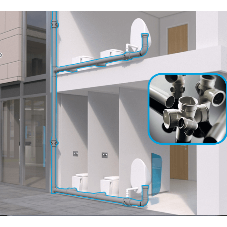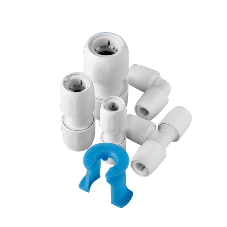The energy bill shock that rippled through the UK over the past two years has permanently changed how consumers think about energy efficiency in their homes. Buyers are more aware than ever that investing in energy-efficient homes will make a difference to their pocket - and they’re eager to hear more.
This is a ripe opportunity for developers to seal the deal with buyers by showcasing the energy efficiency credentials of every aspect of the homes they’re offering. However, to maximise the chances of a sale when dealing with increasingly informed buyers, developers need to make smart choices in every detail, from insulation, to ventilation and heating.
Developers have a golden opportunity to seal the deal with buyers by emphasising the energy efficiency credentials of every aspect of the homes they’re offering. However, developers must choose wisely in every aspect, from insulation to ventilation and heating, to maximise the prospects of a sale while dealing with customers who are becoming more knowledgeable.
In this article, Wavin focus on a technology that’s often overlooked in this picture - Mechanical Ventilation with Heat Recovery (MVHR). They discuss why this solution is such an important part of developing energy efficient homes and residencies and will show you how to angle your conversations with house buyers to give your MVHR-equipped housing stock a competitive edge in the market.
Awareness and fear of rising energy costs is here to stay
Research a year ago showed that 75% of people were worried about their home’s energy performance and, for 25%, energy efficiency would be a crucial factor when choosing their next home. Since then, the cost of living has continued to grow, making UK residents even more cautious. They understand that the increase in energy prices wasn't an isolated incident and that they will need to take it into account when moving into a new home.
The way the war in Ukraine pushed energy prices sky-high was a huge, sudden shock, and highlighted how dependent the UK is on gas - including for electricity generation. Initial estimates put the cost of the energy crisis at the equivalent of £1,000 for every adult in the country. However, that figure doesn’t account for normal wholesale costs, suppliers’ margins or other charges that also come into the average bill. No wonder the International Monetary Fund said that British households were the worst hit in western Europe.
In April 2023, the UK government’s payment scheme to help households with the costs of energy came to an end. And, adding to the price pinch, the Energy Price Guarantee (EPG) – the government-mandated protection bill-payers get from price rises – is set to drop. From July 2023, the EPG will rise from £2,500 to £3,000 per year, meaning an increase of £500 for households to bear.
The cost of the energy crisis is hitting most people hard - even those who are thinking about buying a new home – so they’re eager to find ways to reduce their energy bills. House buyers are more willing than ever to spend money on energy-efficient technologies that will result in longer-term bill reductions. According to research, 80% of people value energy efficiency, and a comparable percentage think installing heat retention devices is a good idea.
Talk to buyers about how to balance insulation with ventilation.
It’s likely that new home buyers will be aware how important insulation is to retain heat and keep energy bills down. But they may be less clued-up about the need to factor ventilation into today’s ‘airtight’ homes to prevent the build-up of humidity that can lead to condensation, mould and damp. This is a highly relevant area for developers to bring up in their marketing communications when explaining the benefits of the heating and ventilation systems they’ve fitted.
Developers who are making the most of buyers’ desire for energy efficient homes are choosing to fit MVHR systems, rather than Mechanical Extract Ventilation (MEV) systems. In terms of extracting moisture from the environment, MEV and MVHR are equally effective - although an MEV system always requires trickle vents that can let in noise, pollution, insects, and cold drafts in high winds. The most significant difference is that MEV doesn’t offer the heat exchange element that MVHR provides.
To a cost-conscious buyer, fitting MEV ventilation that takes valuable heat out of the home along with the moisture it’s extracting just doesn’t make sense financially.
This is where an MVHR system hits the ventilation, heat-retention and cost-saving sweet spot. It takes care of ventilation and air quality, while at the same time retaining the heat from the air being expelled, transferring this costly warmth to the cool, fresh filtered air coming in. In addition, during the summer months, when heating a home isn’t the priority, the heat recovery element of an MVHR system can be switched off without affecting its ventilation abilities, keeping the house cool.
Position an MVHR system as an energy-bill buster
The headline facts speak for themselves - an MVHR system cuts energy costs by heating homes more efficiently. All MVHR system manufacturers agree that the MVHR approach can recover up to 90% of otherwise wasted heat energy and that this recovered energy can reduce a home’s heating requirements by up to 25%.
Wavin have ran tests to check the figures for energy saving potential, comparing MVHR and MEV, and looking at gas-powered heating versus a home fitted with a heat pump. MVHR was a clear winner and came out as the best choice for cutting energy use and holding bills down, in both scenarios.
For a standard, 120m2 four-bedroom house, the contrast in heat loss from ventilation between MVHR and MEV was striking: the MVHR system lost the energy equivalent of 404.7 kWh against a loss of 3,679.1 kWh for the MEV system. Put another way, an MEV system wastes around nine time more energy than its MVHR equivalent. In both scenarios, the net annual energy saving of MVHR over MEV was 3,274.4 kWh. Calculating these figures based on energy prices from January to March 2023, a gas-powered house would save on average £209 a year, and a home powered by an electric heat pump would save on average £1,041 a year. When talking to buyers for whom every penny counts, these ongoing savings speak volumes.
Building in proven energy efficiency measures bring a premium
New build houses with maximised energy efficiency are good for the planet, popular with buyers and excellent news for developers. December 2021 research revealed that 70% of respondents nationwide would like their property to be more eco-friendly, and 35% would pay up to 10% more for a property with eco-friendly features.
Energy efficiency sells houses, and it’s an effective way for developers to pull ahead of the competition – selling more homes at a price premium. MVHR systems are a key part of this. Keep an eye on their website for more updates on this developing area of the new-build market. Wavin are closely following how the heating and ventilation market, and related technology, is developing.
Discover more about MVHR here and how Wavin can help you with indoor climate solutions on your next project here.
How MVHR may save energy costs and increase developer profits
| T | 0844 856 5165 |
|---|---|
| E | online.enquiry@wavin.com |
| W | Visit Wavin's website |
| Wavin Limited, Parsonage Way, Chippenham, SN15 5PN |
Products by this Company





